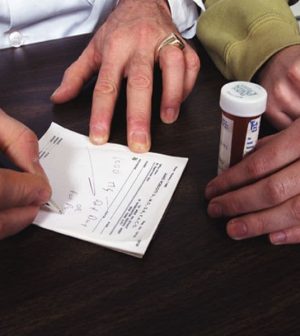- Could Your Grocery Store Meat Be Causing Recurring UTIs?
- Are You Making This Expensive Thermostat Error This Winter?
- Recognizing the Signs of Hypothyroidism
- 10 Strategies to Overcome Insomnia
- Could Artificial Sweeteners Be Aging the Brain Faster?
- Techniques for Soothing Your Nervous System
- Does the Water in Your House Smell Funny? Here’s Why
- Can a Daily Dose of Apple Cider Vinegar Actually Aid Weight Loss?
- 6 Health Beverages That Can Actually Spike Your Blood Sugar
- Treatment Options for Social Anxiety Disorder
Which Drugs Work Best for ADHD? Large Study Zeroes in on Two

Researchers have identified what they describe as the safest, most effective short-term drug treatments for attention deficit/hyperactivity disorder (ADHD).
It’s methylphenidate for kids and amphetamines for adults, according to a new study.
Those conclusions are drawn from an analysis of more than 133 clinical trials that included more than 14,000 children and teens, as well as 10,000 adults.
The researchers compared seven ADHD drugs — amphetamines (including lisdexamfetamine), atomoxetine, bupropion, clonidine, guanfacine, methylphenidate and modafinil — and a placebo over 12 weeks of treatment.
The study was published online Aug. 7 in The Lancet Psychiatry journal.
“Medication can be an important tool for people with ADHD, and our study illustrates that in the short term, these can be effective and safe treatment options for children, adolescents and adults,” researcher Andrea Cipriani said in a journal news release. Cipriani is an associate professor in the Department of Psychiatry at the University of Oxford in England.
He said the data only allowed researchers to compare effectiveness at 12 weeks, but adults and children can be on the medications for a longer time. He said more study of their long-term effects is needed.
“Environmental modifications — such as changes made to minimize the impact of ADHD in day-to-day living — and non-pharmacological therapies should be considered first in ADHD treatment, but for people who require drug treatments, our study finds that methylphenidate should be the first drug offered for children and adolescents, and amphetamines should be the first drug offered for adults,” Cipriani said.
Antipsychotic drugs and antidepressants are often prescribed for ADHD, but they weren’t included in the study because they do not treat core symptoms, the researchers said.
Nor did the study examine behavior therapy. The researchers said, however, that it should be discussed with patients and caregivers, and possibly offered before ADHD drugs.
Medications do not cure ADHD but can help people concentrate better, be less impulsive, feel calmer and develop new skills. Breaks from medication are sometimes recommended to find out whether it’s still needed, but drugs to treat ADHD can be taken for more than 12 weeks at a time, the researchers explained.
ADHD is believed to affect 5 percent of school-age children and 2.5 percent of adults worldwide.
“With an increasing number of people being diagnosed with ADHD and given a drug prescription in the USA, our study provides a starting point for medication, and hopefully helps patients more quickly find a drug that works for them,” Cipriani said.
Mark Stein, director of the ADHD and Related Disorders Program at Seattle Children’s Hospital, wrote an accompanying editorial in the journal.
“As diagnostic rates of attention-deficit hyperactivity disorder (ADHD) increase worldwide, the most common questions asked by patients are whether to start a medication, which one, and for how long,” he wrote.
These findings “clarify inconsistencies in earlier reviews and meta-analyses, some of which have generated much controversy,” Stein added.
More information
The U.S. National Institute of Mental Health has more on ADHD.
Source: HealthDay
Copyright © 2026 HealthDay. All rights reserved.










